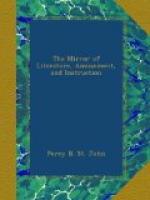[1] Childe Harold, Canto iv.
The noble bard, not content with perpetuating Arqua in these soul-breathing stanzas, has appended to them the following note:—
Petrarch retired to Arqua immediately on his return from the unsuccessful attempt to visit Urban V. at Rome, in the year 1370, and, with the exception of his celebrated visit to Venice in company with Francesco Novello da Carrara, he appears to have passed the four last years of his life between that charming solitude and Padua. For four months previous to his death he was in a state of continual languor, and in the morning of July the 19th, in the year 1374, was found dead in his library chair with his head resting upon a book. The chair is still shown amongst the precious relics of Arqua, which, from the uninterrupted veneration that has been attached to every thing relative to this great man from the moment of his death to the present hour, have, it may be hoped, a better chance of authenticity than the Shaksperian memorials of Stratford-upon-Avon.
Arqua (for the last syllable is accented in pronunciation, although the analogy of the English language has been observed in the verse) is twelve miles from Padua, and about three miles on the right of the high road to Rovigo, in the bosom of the Euganean Hills. After a walk of twenty minutes across a flat, well-wooded meadow, you come to a little blue lake, clear, but fathomless, and to the foot of a succession of acclivities and hills, clothed with vineyards and orchards, rich with fir and pomegranate trees, and every sunny fruit shrub. From the banks of the lake the road winds into the hills, and the church of Arqua is soon seen between a cleft where two ridges slope towards each other, and nearly inclose the village. The houses are scattered at intervals on the steep sides of these summits; and that of the poet is on the edge of a little knoll overlooking two descents, and commanding a view not only of the glowing gardens in the dales immediately beneath, but of the wide plains, above whose low woods of mulberry and willow thickened into a dark mass by festoons of vines, tall single cypresses, and the spires of towns are seen in the distance, which stretches to the mouths of the Po and the shores of the Adriatic. The climate of these volcanic hills is warmer, and the vintage begins a week sooner than in the plains of Padua. Petrarch is laid, for he cannot be said to be buried, in a sarcophagus of red marble, raised on four pilasters on an elevated base, and preserved from an association with meaner tombs. It stands conspicuously alone, but will be soon overshadowed by four lately planted laurels. Petrarch’s fountain, for here every thing is Petrarch’s, springs and expands itself beneath an artificial arch, a little below the church, and abounds plentifully, in the driest season, with that soft water which was the ancient wealth of the Euganean Hills. It would be more attractive, were it not, in some seasons,




